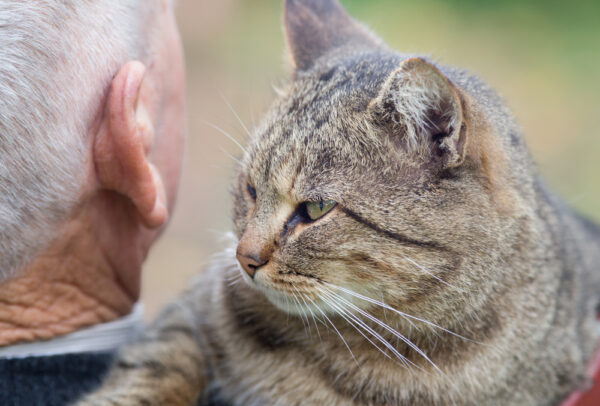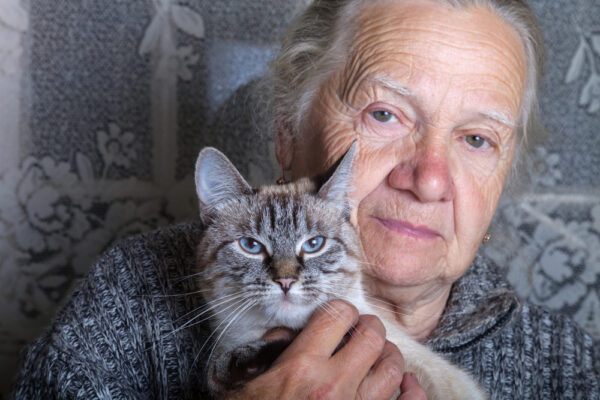
Shelter Cat Fostering Reduces Loneliness: Benefits for Older Adults Living Alone
A recent study funded by the Human Animal Bond Research Institute (HABRI) found that cat fostering reduces loneliness and improves mental health in older adults who live alone. Researchers from the University of Georgia and Brenau University conducted the study, which was published in the Journals of Gerontology, Series B.
The study, led by Dr. Sherry Sanderson, investigated the effects of fostering a shelter cat on the well-being and loneliness of older adults living independently. Additionally, the study explored the possibility of participants opting to adopt the foster cat after common barriers, such as veterinary care access, were removed.
Fostering Cats reduces loneliness and Improves Overall heath and happiness
The research findings show that fostering cats can have a significant impact on the lives of older adults living alone, improving their overall health and happiness. Dr. Sanderson and her team noted that by addressing obstacles to pet ownership – including pet deposit fees, adoption fees, pet care supplies, and veterinary support – they could facilitate healthier, happier lives for older adults, while also promoting the fostering and adoption of shelter cats.
Participants in the study were recruited through various methods, such as in-person presentations, flyers, and senior living facilities. Health surveys were carried out for participants before, as well as 1-month, 4-months, and 12-months after being placed with the cats. The supplies and veterinary care needed for both the cat and human participants were provided throughout the study, ensuring that all participants maintained good health.
Fostering Cats Reduces Loneliness
The results showed a significant decrease in loneliness scores at the 4-month mark after cat fostering began, as well as a near-significant improvement in mental health. Surprisingly, 95.7% of study participants decided to adopt their foster cat at the end of the study. However, at the 12-month follow-up, loneliness scores were no longer statistically significant, potentially due to the impact of the COVID-19 pandemic on social isolation and loneliness among older adults.
This study serves as a first-of-its-kind research project demonstrating the potential benefits of cat-fostering programs for older adults. HABRI expressed their gratitude to Dr. Sanderson and her team for persevering through the challenges posed by the pandemic in completing this important research.
Cat Fostering REduces Loneliness and improves mental health in older adults
In conclusion, fostering a shelter cat can improve mental health and reduce loneliness in older adults who live independently. This ground-breaking study highlights the importance of continued scientific research to explore the health benefits of human-animal bonds and encourage similar programs in the future.

Frequently Asked Questions
Benefits of Cat Fostering for Older Adults Living Alone
Participating in a cat fostering program provides older adults with companionship, helping to reduce feelings of loneliness and isolation. This companionship can positively influence their mental and emotional well-being.
Emotional Impacts of Fostering Cats for Seniors
Seniors who foster shelter cats can experience an increase in happiness, reduced feelings of loneliness, and a sense of purpose. They form a bond with the animal which contributes positively to their emotional well-being.
Cat Fostering and Mental Health of the Elderly
Fostering a cat can have a positive impact on an elderly person’s mental health, as it can alleviate feelings of loneliness, bring joy, and create opportunities for social interaction with other pet owners or animal caregivers.
Suitable Cat Behaviors for Older Adults Seeking Companionship
Cats that are calm, gentle, and affectionate make great companions for older adults. It is best to choose a mature cat with low energy levels and a history of being sociable, adaptable, and tolerant of handling.
Shelter Programs for Pairing Older Adults with Cats in Need
Certain shelter programs focus on connecting older adults with cats in need of homes. These programs are designed to ensure that seniors and cats with matching temperaments and care requirements are paired effectively.
Fostering Process for Seniors Interested in Caring for Cats
The fostering process for seniors typically involves an application, interview, and a home visit to ensure a suitable environment for the cat. Shelter staff members can provide guidance and support to help seniors adjust to providing temporary care for a foster cat.
Information about HABRI
The Human Animal Bond Research Institute (HABRI) is a nonprofit organization that conducts research on the benefits of the human-animal bond, including studies on the positive effects of cat fostering on older adults living alone.
The University of Georgia’s Role
The University of Georgia has been involved in conducting research studies related to the impact of cat fostering on the overall well-being and loneliness of older adults living alone, providing important insights into the benefits of this practice.